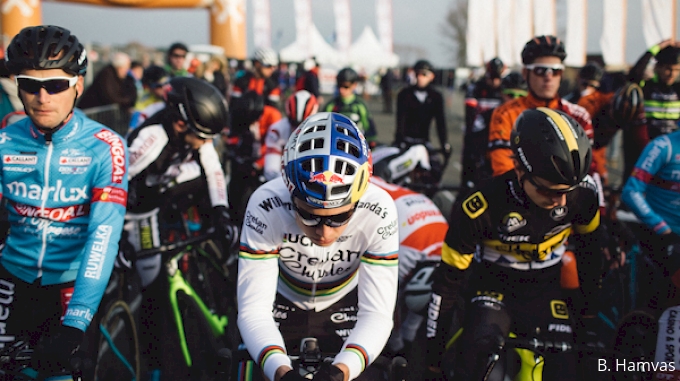Is Belgium Losing Its Grip On Cross?
Is Belgium Losing Its Grip On Cross?
Former Jelly Belly-Maxxis rider Michael Sheehan questions the lifespan of Belgium's reign in cyclocross.

The origins of cyclocross may trace back to early 20th century France, but the discipline has undoubtedly found its home in Belgium — deeply rooted in the wet winters of northern Europe.
Belgium has dutifully produced the vast majority of dominant elite cyclocross racers in modern history. A quick glance at results from the Elite Men’s World Championships reveals that, over the last 20 years, Belgium won 15 editions. The Netherlands and the Czech Republic are the only countries in that period to upset the elite Belgian men.
However, a glance at the results from the junior, under-23, and women’s fields at the most recent world championships tells a different story. While Belgium again dominated the elite men’s race, the United Kingdom won both the junior men’s race and the women’s under-23 race. And three American women placed in the top 10 of the elite women’s field.
Furthermore, the top-placing Belgian in the men’s junior race finished eighth, while American Lane Maher scored a top-five result.
Do these results represent a trend in the discipline’s continued internationalization? Or will Belgium continue to rule?
The Belgian Mafia
Geoff Proctor, head of USA Cycling’s Cyclocross program, spoke to FloBikes about the challenges other countries face when trying to break the Belgian’s stranglehold on the sport. Proctor highlights that historically America, among other countries, emphasizes developing Olympic disciplines while “in Belgium, cyclocross is very much a part of their disciplinary ecosystem.”
Proctor has been developing American cyclocross riders for over 15 years. He is perhaps best known for running the EuroCrossCamp prior to transitioning to his current position at USA Cycling as cyclocross performance consultant. Proctor has given many of America’s best cyclocross (and road) racers their first taste of Belgian mud over the years. And while doing so, he has closely studied Belgium’s approach to developing their own Cyclocross program.
A major key to Belgium’s success, says Proctor, is that in Belgium “cyclocross functions as an end and a means. As a terminus, cyclocross is a respected, refined, and complete endeavor. As a means it’s hugely instructive and informative to success in other disciplines.”
Proctor points to racers like Sven Nys and Sanne Cant, who’ve made a career in Belgium from racing cross, as well as racers who’ve transitioned from cross into pro road racing — point most recently illustrated by world champion Wout van Aert, who recently made headlines in road cycling following his third-place finish at Strade Bianche.
Belgium’s success is aided by the indelible nature of cycling in Flanders, as described by Proctor. Belgium boasts provincial cyclocross weekend training sessions along with significant opportunities for teams in the form of training, racing, and media exposure. However, perhaps cyclocross’ greatest asset in Belgium is the quality of riders willing to commit to cyclocross, in addition to (or even over) other Olympic cycling disciplines (road, track, and mountain biking).
Cracks In The Armor
Proctor acknowledges that Belgium — and to a lesser extent the Netherlands — is the epicenter of cyclocross. However, he highlights the success of Switzerland’s EKZ Series and the Coupe de France races, the latter of which boasts “off-the-charts participation” according to Proctor.
He also takes pride in America’s growing domestic scene, with its “thriving and international early season with two domestic World Cups.” This sets America’s best riders up for their European campaigns throughout the end of fall and into winter.
Proctor points to the American women such as Katie Compton, Ellen Noble, Kaitie Keough, and Elle Anderson, who’ve all made cyclocross their predominant discipline and subsequently found astounding success internationally.
While Belgium may still be central to the sport, Proctor is optimistic about internationalization.
“Cyclocross is progressing all over the world, but at different rates and in different ways,” he says. Proctor undoubtedly has plans at USA Cycling to continue America’s bid for international success. “We have a long way to go, but we have tremendous potential.”
The Olympic Conundrum
Belgium seems to have the upper hand in the elite ranks due in part to the country’s ability to retain its talent within the sport. Former junior cyclocross medalists include the likes of Peter Sagan, Julian Alaphilippe, and Roman Kreuziger, all of whom are now enjoying incredibly successful road cycling careers.
However, the last three years may reveal a potential chink in Belgium’s cyclocross future. Belgium has not managed to secure a medal in the junior men’s race or the under-23 women’s race in the past three world championships. Young British riders like Tom Piddock and Evie Richards pose a threat to the future of Belgium’s elite dominance, but the draw for young talent to transition to Olympic disciplines remains perhaps the greatest challenge to the growth and internationalization of the sport.
Following the end of the 2017-18 season, many of cyclocross’ top riders are securing support and declaring their intention to vie for a Tokyo 2020 Olympic selection. Ellen Noble has secured sponsorship from Trek to support her cyclocross ambitions in addition to mountain biking, which she hopes to compete in during the upcoming summer games.
Stephen Hyde likewise has bolstered his support from Cannondale-CyclocrossWorld.com, as he too hopes to make America’s mountain bike team. Mathieu van der Poel is another notable rider eyeing the Tokyo mountain bike race.
With the draw of the Olympics as a powerful motivator for riders, sponsors, and national federations alike, perhaps the most effective way to internationalize cyclocross is to allow it into the Olympics. Talk of cyclocross in the Winter Olympic Games has been present for almost a decade, with many of the sport’s key figures endorsing the idea, not least of whom is Geoff Proctor.
“As a member of the UCI Cyclocross Commission for the past eight years, I advocated for Olympic inclusion at every opportunity,” he says. “And I now just read an interview where Katerina Nash (newly appointed to the Commission) speaks of the same objective. Cyclocross as an Olympic discipline would really help with the development of the sport. I think there’s a ton of support from the base of the pyramid, but I sense that the IOC is where the real discourse needs to take place.”
The primary obstacle cyclocross faces in its bid to become an Olympic discipline is the rule which states that all Winter Olympic sports must be practiced on snow or ice. Inclusion in the Winter Olympics could be the single greatest boon to the international profile of the cyclocross field, but until the wording of that one rule is changed, cyclocross will be at a disadvantage to cycling’s other disciplines.
Belgium by no means has a monopoly on the world’s cyclocross talent. However, their cycling-centric culture encourages young riders to commit to a multidisciplinary schedule of racing and is able to support a greater number or riders willing to remain within the sport.
Inclusion as an Olympic discipline may be the most effective means to spur the development of the sport on an international level.
Words by Michael Sheehan / Images by Balint Hamvas

